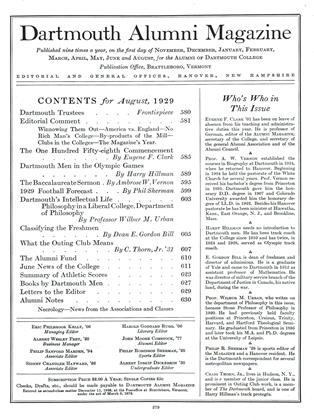For opinions which appear in these columns the Editors alone are responsible
The work of interviewing applicants for admission to Dartmouth College, as an incident to the Selective Process machinery, was completed for the current year by the middle of March. This work is done under the general direction of the members of the Alumni Council, assisted by trusted committees of alumni scattered about in various regions, with intent to add to the information already possessed by the Director of Admissions certain facts which bear on the probable suitability of the applicants.
It is generally understood, no doubt, that this alumni investigation has little or nothing to do with the question of scholastic standing—that being already canvassed by Dean Bill's office from other sources. The alumni interviews relate mainly to character, aptitudes, personal appearance and probable fitness to make a creditable showing as a member of the Dartmouth student body. The applications continue to be so much more numerous than the available number of places in the next entering class that it is not only desirable, but downright imperative, to do some intelligent winnoW;ing, so that the 500 or so of young men who are chosen from among 1200 or more as fittest to be accepted shall be pretty thoroughly tested in as many directions as possible. It is no small job, but it is gratifying to learn from Dean Bill that the efficiency with which it is being done seems steadily to increase.
In 1924, when the work was new, only 35 per cent of the applications were reported on by alumni investigators. This year the percentage of applications reported on was 87—probably as good a showing as is physically possible. The still more interesting statement, in a way, is that whereas in 1927 the alumni investigators reported nearly 9 per cent of the applicants to be "unfavorably" considered by them, they reported unfavorably in 1929 on only 5.3 per cent. Now that means either that the material investigated this year averaged much better than it did two years ago, or that the investigators are growing less and less exigent. The probability is very strong that the investigators are, in fact, growing more exacting, rather than less. Hence the belief, which the Director of Admissions has recently professed, that it is more likely to be the natural and logical development of the system, in that "schools all over the country are warning the poorer type of boy against making application for Dartmouth."
This year 1192 application blanks were referred to the Alumni Councillors for rating. Of these, only 49 were unaccounted for on March 15—the closing date for this investigation. Of the remaining 1143, 102 were returned with no information and 55 revealed a change of plans, either by postponing the year of admission, or by decision to seek some other college, or by abandoning the idea of college training altogether. Full reports were received on 886 applicants. Of these, 398 were marked "very favorable," 441 were "favorable" and 47 were set down as "unfavorable." To a casual eye this seems to indicate a very proper discrimination; for it is easy enough, as those know who have done such work, to overdo the "very favorable" recommendation when considering a long list of reasonably promising boys.
Whether or not a report of "unfavorable" would always amount to blackballing the candidate is not clear, but it is to be assumed that as a rule it would come pretty near it in a situation such as that which annually faces the office of the Director of Admissions. He has perhaps 1200 applications which seem worth considering and refers these to the alumni, in order to find out as well as possibly can be done what manner of boys these really are. Only about 500 can be accepted at most. That means that not even all the "favorable" ones can get in—let alone the "unfavorable." Still, there might be the rare case in which it would be apparent from some related factor that the "unfavorable" candidate ought still to be preferred—and there is small doubt he would be, if the fact were clear.
Meantime a word of praise is due the alumni who annually undertake this work—it entails more or less expenditure of time on the part of busy men—for the efficiency with which they do it. The best commentary on the Selective Process is bound to be its fruits, and the curve of "mortality" produced by subsequent separa- tions from College has shown a most creditable trend. With the greater care in making the selections, the number falling by the wayside in college has decreased.
 View Full Issue
View Full Issue
More From This Issue
-
 Class Notes
Class NotesCLASS OF 1879
August 1929 By Henry Melville -
 Article
ArticleAlumni Council Meetings
August 1929 -
 Article
ArticleThe One Hundred Fifty-Eighth Commencement
August 1929 By Eugene F. Clark -
 Class Notes
Class NotesCLASS OF 1899
August 1929 By Warren C. Kendall -
 Class Notes
Class NotesCLASS OF 1903
August 1929 By John Crowell -
 Class Notes
Class NotesCLASS OF 1918
August 1929 By Frederick W. Cassebeer







